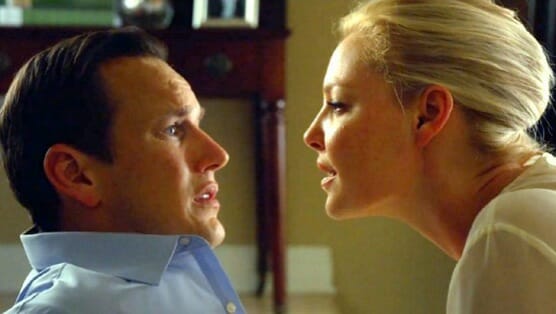
“Less is more” is an often-heard tenet of good storytelling—but one that the filmmakers behind the purported dark comedy Home Sweet Hell ignored. That there are three writing credits (Carlo Allen, Ted Elrick and Tom Lavagnino) attached to a 98-minute movie is only the first of many red flags in this “satire” (we think) about marriage, murder, mental illness and/or life in suburbia. Director Anthony Burns (Skateland) presents an over-the-top, unfunny and ridiculous misogynistic mess of a movie in which the female characters are either beautiful, cold-hearted murderers or beautiful whores.
Taking a few cues from John Waters’ Serial Mom (1994), Katherine Heigl steps into the role of a psychopath in a Stepford-wife wardrobe. From the film’s opening frames, the audience knows that something’s amiss with Mona Champagne. She greets her family with fake smiles and backhanded compliments, and her seemingly pleasant countenance belies a rage just beneath the surface. Mona’s OCD manifests itself in her unhealthy affinity for scrapbooking her family’s life and goals; and her true nature surfaces during a split-second shot in which she rearranges the kitchen knives in a knife block with the force and acumen of a samurai warrior.
Although Mona is already unlikeable from the outset, the filmmakers somehow found it necessary to add another vile layer to the character: She’s a bigot to boot. She calls her gay neighbors “ladies” and spouts offhanded and offensive dialogue like “At least she’s not Mexican,” or “Daddy says to hire a Jew … all they do is make money.” There’s no need for this extra dimension to the character—we got the message in the first two minutes of the film. Burns and the screenwriting team should have channeled their efforts elsewhere, perhaps delving further into Mona’s psyche or toward crafting a more interesting or original plot. Nothing, and we mean nothing, happens in Home Sweet Hell that the audience can’t predict.
Patrick Wilson plays Mona’s better, or at least other, half. Don’s a milquetoast husband who goes along with the charade. From the outside looking in, Don has it all: a pretty wife, two kids in private school, a tidy and comfortable home and a successful furniture business, all thanks to his wife’s parents. Don’s kept on a tight leash, and Mona organizes his entire life. Every aspect of it. When he gets a little frisky at bedtime, she rebuffs him with, “We will have sex on the 9th as scheduled.”
So when Don hires a pretty new salesgirl Dusty (Jordana Brewster), it’s easy to understand why he falls for her out-of-the-blue seduction. When Dusty tells Don she’s pregnant and needs money for medical care, Don confesses his transgressions to Mona, who becomes completely unhinged. Mona insists that murder is the only answer to keep their perfect life together.
Burns’ direction and shot choices are serviceable, but pedantic; and the film’s pacing is uneven. Home Sweet Hell’s slow-boiling, secondary extortion plot is so protracted and predictable that instead of adding much-needed spark and action to the story, it only fuels audience ennui. The exposition takes entirely too long, and all the “plot twists” and action sequences are crammed in toward the end. There’s an unnecessary scene of Don dabbling with crystal meth—hilarious, right?—and a number of gratuitous shots of topless women either dancing at a strip club or having sex with the various male characters. There are a lot of boobs and bloodletting during the last third of the film, but since no one’s emotionally invested in any of these characters, the sex and violence becomes boring. One moment, however, does pique some interest: Don finally grows a pair and asks what happened between Mona and her overbearing parents (whom we never see) during her childhood. It’s only a tease though, and that thread is never explored.
If there were a point to this film, it’s completely lost on us. If it’s meant to be a modern parable, then is the takeaway that women should stop being control freaks? Or that wives should do whatever they can to keep their husbands sexually satisfied to prevent straying? Or is it that a perfect suburban life is an urban legend? Both Heigl and Wilson do what they can in their limited, one-dimensional roles, but try as they might, the leads and supporting cast—including Jim Belushi as Don’s obligatory best friend—can’t bring the audience around to care for these characters. In the end, Home Sweet Hell is neither an adequate black comedy nor a good slasher film. It’s just hellish. There’s nothing sweet about it.
Director: Anthony Burns
Writers: Carlo Allen, Ted Elrick and Tom Lavagnino
Starring: Katherine Heigl, Patrick Wilson, Jordana Brewster, Kevin McKidd, AJ Buckley and Jim Belushi
Release Date: March 13, 2015
Christine N. Ziemba is a Los Angeles-based freelance pop culture writer and regular contributor to Paste. You can follow her on Twitter.